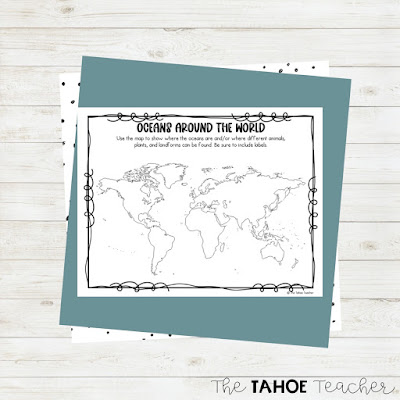Oceans Phenomenon-Based Learning
Hey, y'all! Have you tried Phenomenon-Based Learning yet? I'm sure you've heard me talk about it by now, but if you haven't, it's a game-changer!Phenomenon-based learning is an instructional strategy used successfully in Finland (and largely based on research from the US) where students are given a topic and explore it from every subject area. In this case, students are learning about the ocean and all that encompasses.
Students read all about the oceans, map out where they are and important landmarks, explore plants and animals in the ocean, and that's just the beginning.
In the beginning of the unit, I pose an essential question. In this case, our questions are: "How are humans dependent on the ocean?" and "How is climate change affecting the oceans?" There are a whole slew of resources included this unit for students to take their research in a number of ways. And it's easy to see how everything fits together as students get started researching.
Math time can look like reading the temperatures of different points in the ocean from the NOAA website and tracking the changes over time. Or measuring the heights of waves, or depths of different points in the ocean. With modern technology, there are websites EVERYWHERE to help facilitate this without putting your entire class into wetsuits! They can calculate the surface area of the oceans, or for younger students, they can compare these numbers that are calculated for them.
Reading is integrated into everything. Like, literally everything. When your students start researching their science and social studies questions about the ocean, they'll be reading up a storm.
In science and social studies, students can study climate change, pollution, plants and animals in the ocean, geography of the ocean floor and important places along the coast. They can explore different careers related to the ocean like fishing, oceanography, coast guard, and more. They can study the impact of humans on sea life, both the good and the bad, then make their own judgements and predictions about how they can have positive impacts. They can explore how each of the oceans are similar and how they are different--what species of plants or animals only live in certain regions and why that is.
The beauty is that since it's student-centered, once the kids get going, the questions don't stop! They get so involved in what they're doing that they just want to know more. These types of units are the ones that create life-long learners. Students can actually see how they would use different skills in real life and how everything is connected.
You can find this resource and more by heading over to my Teachers Pay Teachers store or by clicking here. This is a brand new series so new topics are being added frequently. Be sure to follow my store so you know when the newest resources are added.
I hope you have a wonderful week and I'll talk to you soon.
Stay cozy,







No comments
Post a Comment